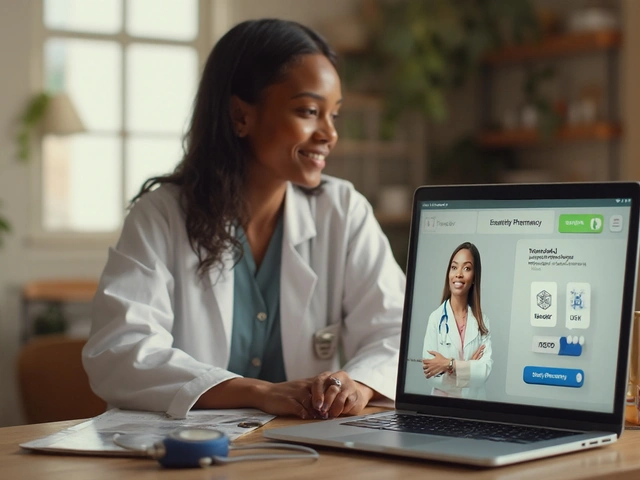Is it possible to find a medicine online that people consider a life-changer, yet the path to buying it is full of twists and risks? Welcome to the saga of Finpecia—an affordable, generic version of finasteride trusted by people trying to fight male-pattern baldness. But while grabbing a bottle online seems easy, the world of digital pharmaceuticals isn’t a free-for-all. There’s a real difference between saving your hair and risking your health (or your wallet) on dodgy sites. That’s why I’m here to lay things out straight, based on real-world advice, facts, and the realities of buying prescription meds on the web.
What Exactly Is Finpecia and Why Do People Buy It Online?
Finpecia is a generic version of finasteride, a prescription med originally developed for enlarged prostate but better known these days for treating male-pattern baldness. Manufactured by Cipla, which is a household name in Indian pharmaceuticals, Finpecia contains 1 mg of finasteride per tablet—the same as the much pricier branded Propecia. So why do people hunt for it online, especially in countries like the UK?
The answer’s simple: cost and convenience. In the UK, branded finasteride can stretch your budget. If you’re buying privately, one month’s supply may clock in at over £40 at a high-street pharmacy. In comparison, Finpecia from reputable online pharmacies can come down to just £10–£15 a month, sometimes less if you buy in bulk. For long-term treatments that people start in their twenties and continue for years, those savings add up fast.
There’s another reason for its online appeal—privacy. Not everyone wants to discuss hair loss face-to-face with the local GP or the pharmacy counter staff. Ordering online gives you distance and, sometimes, a bit more control over who knows your business.
But—and it’s a big but—UK law still considers finasteride a prescription-only med. That means it’s supposed to be dispensed by licensed pharmacies with a valid prescription. And even though dozens of websites promise ‘no prescription needed’ deals, this should set off alarm bells. It’s one thing to save a few quid; it’s another to risk getting fake, ineffective, or dangerous pills shipped in from the back of beyond.
Let’s look at the numbers. In 2023, a survey by the British Medical Association reported that 25% of men in their thirties in the UK had considered online treatments for hair loss, and of those, half said they found it difficult to tell genuine pharmacies from scam sites. The rise of telemedicine (online doctor services) has helped, but the lack of clarity and the risk of counterfeits is still very real.
So online Finpecia shopping is all about weighing convenience, price, privacy, and—most of all—safety. Most experts recommend sticking to official or UK-registered online pharmacies, but there’s a lot more to the story.
How to Buy Finpecia Online in 2025 Without Getting Scammed
If you type “buy Finpecia online” into your search bar right now, you’ll find hundreds of offers. The trouble is, some of these are smooth-looking but shady operators out for your money or, worse, your health. The first step before you buy is knowing what a legitimate online pharmacy looks like.
Legit online pharmacies will always:
- Require a valid prescription from a UK-registered doctor, or offer a digital consultation before dispensing medications.
- Display their General Pharmaceutical Council (GPhC) registration number clearly, usually at the bottom of the site and often with a clickable green label that links to their record.
- Use secure (HTTPS) checkouts and never ask for hugely personal data beyond what is necessary for healthcare and shipping.
- Have clear, traceable contact details—somewhere in the UK, with real phone numbers and sometimes a licensed premises address.
Watch out for these red flags:
- Prices that seem way too low (like £5 for 90 tablets—if it looks too good to be true, it is).
- Websites that have loads of spelling errors, weird redirects, or are based only on mobile payment platforms.
- Shops that claim to ship internationally, especially from countries with different health regulations, with no prescription needed.
- Sites that hide their customer reviews or only show “testimonials” on their own site, never on independent platforms.
By mid-2024, the UK Medicines and Healthcare products Regulatory Agency (MHRA) clamped down hard on hundreds of websites selling fake or unlicensed finasteride. They seized thousands of unmarked pills in mail centers and shut down dozens of websites in coordinated raids. This shows how risky it is to cut corners.
If you want to play it safe, use these practical steps:
- Start with the GPhC’s online pharmacy checker tool (just Google ‘GPhC register’). It lists every legal UK-based online pharmacy by name and web address.
- Check for a ‘distance selling’ license if the pharmacy operates solely online. This means they’re allowed to deliver across the UK.
- Look for online doctor services that offer a quick web-based consultation (these are increasingly popular and a legal workaround for getting a prescription without the awkward GP visit).
- Always pay with secure methods (credit/debit cards)—never with Western Union, PayPal Friends & Family, or cryptocurrencies.
- Search for independent Trustpilot or Google reviews, and check for common complaints about fake meds, delivery issues, or refusal to refund.
Walk into any forum about hair loss and you’ll see horror stories from people who tried knockoffs and ended up with pills that didn’t work at all—or, scarier, had unknown side effects. Stay sharp and stick to pharmacies that tick every box above.

Trusted Online Pharmacies and Telemedicine: What Works Best?
The digital pharmacy world in the UK has changed a lot over the last five years. Now, there are several reputable online services that specialise in hair loss treatment. Services like Lloyds Online Doctor, Superdrug Online Doctor, and Pharmacy2U are not only official but also easy to use and comparable in price to the best local deals. Many of them operate on a simple “consultation-to-doorstep” model:
- You fill out a medical questionnaire about your hair loss, health history, and any current medications.
- A doctor reviews the form, often within 30 minutes during the day, and either approves or rejects your prescription.
- If approved, you pay and the pharmacy packs and dispatches your Finpecia or other finasteride product discreetly to your address, often with tracking.
- Some services offer subscription refills, saving you the hassle of reordering every month.
Prices are still higher than on so-called “grey market” or overseas sites, but in return you get the actual medication, with a proper batch number and full paperwork. Don’t forget: it’s illegal in the UK to import prescription drugs for your own use from overseas pharmacies unless they’re registered in the UK. Customs can, and sometimes does, seize such orders.
You may be curious if there’s a difference between buying generic versions (like Finpecia) or branded Propecia. For all practical purposes, if you’re buying from a legit supplier, the active ingredient is identical—1 mg finasteride per tablet. The only real difference is price and maybe pill shape or colour. That’s why a lot of savvy shoppers in the UK look specifically for generics like Finpecia—it’s all about savings long-term, especially for people committed to a treatment plan of two years or more.
But if you’re exploring the international worldwide web for cheaper options, be careful: Customs and the MHRA have increased checks on parcels from India, Singapore, and Eastern Europe. Even when shipments get through, there’s always uncertainty about quality and legitimacy. Pills may arrive with the wrong dose, no labeling, no leaflet, or even fake branding.
In the last major review in 2023, the European Medicines Agency highlighted that up to 20% of online-dispensed finasteride in Europe failed laboratory quality checks. So for most people, the safest route is to use a UK-registered site, even if it costs marginally more.
If cost is a major issue, you can try discussing your needs with your GP or an NHS pharmacist. Sometimes they can access generics through special patient requests at reduced cost, cutting out the online uncertainty. But for quick, confidential service without appointments, trusted telemedicine is hard to beat.
Risks, Side Effects, and Smart Tips for Using Finpecia
People sometimes forget that just because you can buy a pill online, doesn’t mean it’s totally safe. Finpecia carries potential side effects—these can range from mild (like reduced libido, softer erections, and mood swings) to rare but more serious problems (persistent sexual dysfunction, depression, or allergic reactions).
Research published in The Lancet Neurology in 2022 found that about 4% of users reported sexual side effects, but for most people, these eased up after stopping the medicine. Still, every body is different. That’s why the best practice is to take your first prescription under a doctor’s review, and report any symptoms you notice.
Here are a few practical don’ts:
- Never double up on doses if you forget to take one—just take the next tablet as scheduled.
- Keep the medication in its original packaging, away from light and moisture.
- Don’t share your pills with mates, even if they have the same symptoms.
- If you decide to stop taking Finpecia, don’t expect instant results. Hair loss usually resumes within a few months of quitting.
- Store safely if there are children or pets about—finasteride can harm babies and is not meant for women, especially those who are pregnant or might become pregnant.
As for results? Patience is key. Clinical trials show about 85–90% of men see hair loss slow or stop after six months, but new growth is less dramatic—best case, you can regain some lost density, but don’t expect miracles overnight.
If you’re interested in numbers, here’s a quick breakdown:
| Result | Percentage of Users | Timeline |
|---|---|---|
| Stabilizes hair loss | 85–90% | 6–12 months |
| Notices visible regrowth | 65% | 12 months |
| Experiences side effects | 3–5% | Varies |
Remember, NO genuine online pharmacy will ever claim 100% success or zero risk—it’s just not reality. If you read that on a site, you’re probably better off closing that tab.
Here’s one last sanity check—if you’re not sure about a site, shoot a quick email to your local pharmacy or GP and ask their thoughts. They can usually spot a fake or steer you to safer, UK-based options. And never forget that whatever bargains you find online, your health is worth more than a few saved pounds. Genuine pharmacies might cost a tad more, but the peace of mind (and actual real medicine) you get is more than worth it.








Posts Comments
Abraham Gayah August 16, 2025 AT 13:41
Start with the regulator check and don’t skip it - that single step filters out 90% of the scam sites.
Look for the GPhC badge and cross-check the registration number; if it’s missing or fake, move on. Cheap pills that come with no batch number or leaflet are basically counterfeit theatre, and your scalp isn’t a prop. For long-term use, consistency and traceability matter way more than saving ten quid this month. Keep receipts, screenshots of the order page and the pharmacy’s contact info in a folder - you’ll thank yourself if anything goes sideways. Treat online meds like a contract: if the vendor can’t prove legitimacy, don’t buy.
Caley Ross August 19, 2025 AT 18:27
Telemedicine cut the awkwardness for me and it works fine when you pick a legit service.
Fill the questionnaire honestly and the doctor will either approve or not - saves the GP drama and gets the script fast. Subscriptions are handy for forgetting to reorder, but still check delivery packaging and batch info when it arrives. If anything looks off, stop taking it and get a pharmacist to check the tablet imprint.
rajendra kanoujiya August 21, 2025 AT 18:41
Telemedicine is neat but people act like it’s foolproof, it isn’t.
Some of those online doctors are rubber-stamping scripts just to make margins, and that undercuts safety. Always pair the telemedicine route with a quick GPhC and Trustpilot verification before paying.
Bobby Hartono August 24, 2025 AT 03:27
I switched to a UK-registered online doctor last year and stuck with them because they answered my dumb questions without making me feel like an idiot, so here’s how it went and what I learned that actually matters.
First, the questionnaire looked scary but it was just routine stuff about meds and family history, nothing dramatic. The doc approved the script the same day, the pharmacy sent a tracked parcel and the pills had proper labeling and a leaflet tucked inside. I kept the packaging and the batch number in my phone photos because you never know.
Second, the price was higher than some overseas offers but the peace of mind was worth it to me. I didn’t get weird strips or blank tablets, and the pharmacy offered a subscription that let me pause deliveries easily when I travelled. The only downside was waiting six months before I could say if anything actually worked, which is standard but still kind of a drag for impatient folks like me.
Third, side effects were annoyingly minor for me - a couple weeks of lower libido that eased off - and I reported it to the online prescriber who switched me to a lower dose plan to monitor. They logged it properly and I had actual medical notes, which felt proper. Keep in mind, stop if you notice anything serious and get checked by a GP; online services can advise but sometimes you need an in-person exam.
Fourth, if you’re worried about cost, talk to an NHS pharmacist or ask your GP to do a generic prescription request; sometimes they can get cheaper generics into the system. I tried that route too and the waits were longer but the price was better if you don’t mind paperwork.
Finally, privacy is real - delivery was discrete and billing didn’t scream ‘hair loss meds’ in big letters, which mattered to me. So yeah, legit UK online pharmacies = convenience + safety, dodgy overseas deals = hell no. Keep records, pick a registered pharmacy, and stay patient for results.
George Frengos August 27, 2025 AT 13:34
Good call on documenting everything and getting a proper prescriber involved from the start.
Maintaining medical records even for a straightforward treatment like finasteride makes follow-ups far easier and protects you legally if there’s an adverse event. Subscriptions are efficient but set calendar reminders to review effects every three months and report changes to the prescribing clinician. That habit keeps the treatment on track and reinforces safety over time.
Jonathan S August 31, 2025 AT 00:21
Legit sites only, always - don’t gamble with your body. 👍
Charles Markley September 3, 2025 AT 12:47
That one-liner is weak sauce though; people need nuance, not slogans.
There’s a whole grey economy feeding off the naive who think a low price equals value. Pharmaceutical supply chains require traceability, temperature control, and regulatory compliance - none of which come free. Cheap knockoffs bypass every step and then wonder why patients end up with subtherapeutic dosing or contamination. If you care about outcomes, austerity in procurement is a false economy.
Nancy Chen September 6, 2025 AT 22:27
Regulatory capture and offshore shell sites are the reason you can’t trust low prices these days, they obfuscate origins and launder credibility with fake badges.
Customs seizures are just the tip of the iceberg; there’s entire networks rerouting product through third-party logistics to hide provenance, and then some sleepy courier delivers a pill with no chain of custody. Lab fail rates aren’t a coincidence when profit margins are the only metric these operators chase. Keep every receipt, don’t rely on pretty logos, and if anything smells off with the packaging assume it’s compromised until proven otherwise. Better to burn a tenner on a legit script than to risk a long-term health hit for the sake of thrift.
Write a comment